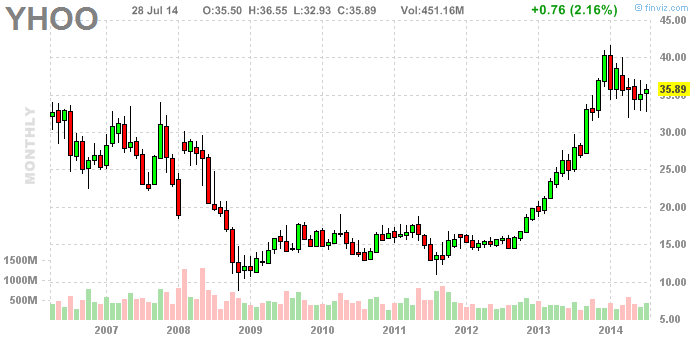
Concept for better investing. I can't prove, in any way, this is reliable, but, buying big companies at low prices might allow you to outperform the more standard approach to conservative investing, index funds, by a considerable margin. By the way, Yahoo may be pretty anachronistic, but it actually is a big company.
How can you tell a company is big? One way is to look at its revenues. Yahoo recently had 4+ billion dollars in revenues. That's the 2013 number. I'd say it qualifies as big.
How can you tell a stock is trading at a low price? I mean, a price was low if, at a later date, the price is higher, but that doesn't help when we're considering an investment. The best I can do is to say, if a stock is "down", the price is, at any rate, "lower". A "lower" price is more likely to be "low", so, assuming other things are equal, a lower price is more likely to be low than a higher price. I'm kind of playing around. I'm kind of playing around with the problem of making decisions based on limited information. In 2007, Yahoo traded above 30. In 2008, it traded under 10. Under 10 was more likely to be low than under 30. Does this make sense?
What can you do with this "information", as, say, a conservative investor? (It's only in a limited way information. It's more like an idea.) Well, part of a conservative or safety oriented plan is diversification. Putting some of your money in an index fund, or the like kind of thing, that's widely approved of as being sort of as safe as it gets, and part into what I've proposed is, at least just at a semantic level, a form of diversification. Don't know if it qualifies as wise. As I say, it's just an idea. I could weigh it out in more detail, but I would risk being boring without actually being informative, so I'll leave it for another time.
For other examples, check the examples link below (in the labels section).
No comments:
Post a Comment